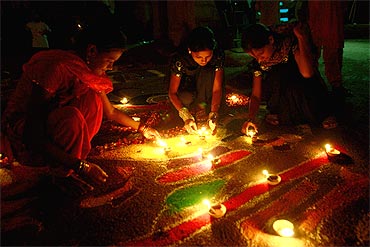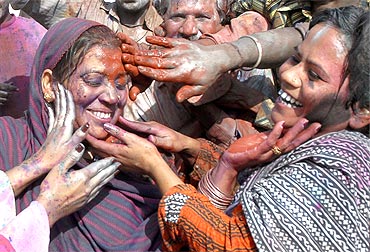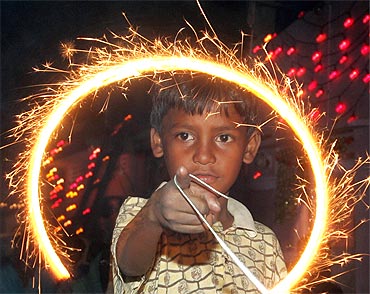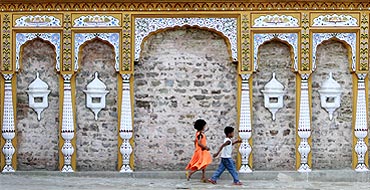Photographs: Athar Hussain/Reuters
Over 100 Hindu families in Pakistan's Balochistan province are making efforts to migrate to India after becoming the target of a campaign of kidnappings and extortion, according to a media report on Monday.
The Hindus of southwestern Balochistan have been hit hardest by incidents of abduction for ransom and extortion, with the records of the province's home department showing that a large number of the 291 people abducted last year were Hindus, The Express Tribune newspaper reported.
Five Hindu families have already migrated from Balochistan's Mastung district to India and six more families are trying to seek asylum elsewhere or to shift to other parts of Pakistan, the daily quoted Hindu elders as saying.
Vijay Kumar, a 33-year-old chemist, claimed that over 100 Hindu families of Balochistan are making efforts to migrate to India because of the campaign of kidnappings and extortion.
"Our relatives are there in India, thus we Hindus prefer to settle in India," he told the daily.
Suresh Kumar, 31, who runs a grocery shop in Mastung district south of Quetta, wants to migrate though his family has lived in Balochistan for almost a century.
"Most of the people are trying to migrate to India or other areas of Pakistan because of the deteriorating law and order situation," Kumar said.
'Hindus want to leave the country at the first opportunity'
Image: Members of the Hindu community celebrate Holi in MultanPhotographs: Asim Tanveer/Reuters
"Kumar is not alone in this desire. Frightened by the rise in kidnappings in which their community is being targeted, many Hindus want to leave the country at the first opportunity," the report said.
In provincial capital Quetta, four of the eight persons kidnapped last year belonged to the Hindu community.
The situation was worse in Naseerabad district, where half the 28 people kidnapped in 2010 were from the minority community.
"It is a common perception that most of the victims were released after paying huge sums of money as ransom to kidnappers. Relatives are reluctant to disclose how much money was paid to the kidnappers, fearing that they will be targeted again," the report said.
Balochistan's Minorities Affairs Minister Basant Lal Ghulshan said, "Recent incidents have shocked us."
Forty-one Hindus were abducted during the past three years and four more were killed when they resisted kidnapping attempts.
Juhary Lal, a well-known trader, was abducted nearly 16 months ago in Naal area of Khuzdar district and his whereabouts are unknown.
The recent abduction of spiritual leader Luckmi Chand Guruji has shaken the Hindu community. Guruji was kidnapped with four followers in December.
The captors released three men and kept the spiritual leader and the son of a trader.
Similarly, an engineer named Nanak Ram was kidnapped near Rojhan Jamali and his whereabouts are still unknown.
The Hindus are ethnic Baloch and have been unaffected by the insurgency in the province. They are being targeted by kidnappers due to the deteriorating law and order situation in Balochistan.
Hindus have lived in several Baloch-dominated districts like Nushki, Dera Allah Yar, Mastung, Khuzdar, Kalat, Jaffarabad, Lasbela, Kharan, Sibi and Kachhi.
Hindus are also part of the Bugti, Marri, Rind, Bezenjo, Zehri, Mengal and other Baloch tribes and live under the tribal system.
'Hindus are business-oriented and in a minority'
Image: A Pakistani boy celebrates Diwali in KarachiPhotographs: Athar Hussain/Reuters
Minister Basant Lal Ghulshan contended that incidents of kidnappings are not confined to the Hindu community only. "Traders and rich men belonging to other sects or religions are also being targeted," he said.
In the past, Baloch tribal elders protected people from minority groups and gave them equal respect, he said. "I appeal to the tribal chieftains to help us," he added.
Asked about the exodus of Hindus, Ghulshan said some families 'might have migrated' but he was unaware about the dozens of families who have reportedly left for India.
He categorically rejected reports that some Hindu families had applied for asylum.
Ghulshan said Hindu businessmen were soft targets. "Kidnappers can get ransom easily as the Hindus are business-oriented and in a minority," he said.
Deputy Inspector General (Operations) Hamid Shakil believed that criminals target only traders and businessmen for money and do not care which community the victim belongs to.
Shakil said another problem was that victims were not willing to testify against their kidnappers.
"Last time we arrested a group involved in the kidnapping of a Hindu trader in Quetta but at the very last (minute), his son changed his statement before the court of law (and) thus the kidnappers were released," he said.
'The report is baseless'
Image: Pakistani children play outside an old Hindu templePhotographs: Faisal Mahmood/Reuters
Provincial Home Secretary Akbar Hussain Durrani too denied that any Hindu family had applied for asylum with the Indian High Commission in Islamabad.
"This is baseless. A person who is a resident in India can apply for asylum, not someone who is not in that country," he claimed.
The Express Tribune reported that the facts on the ground contradicted the Balochistan home secretary's claims.
Saeed Ahmed Khan, a regional director for the federal human rights ministry, recently created a stir when he told a seminar in Quetta that 27 Hindu families had applied for asylum to the Indian High Commission.
He told the daily that the migration of Hindus started in 2005 and was going on. "I have personally observed that many Hindu business families had shifted from Quetta even during the past five years," he said.





article